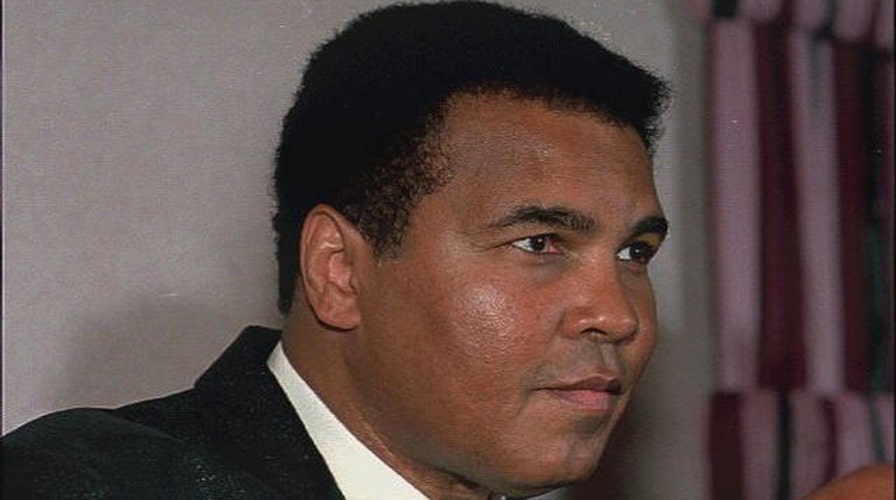Muhammad Ali, the reigning world heavyweight boxing champion, entered the combative ring of politics and culture by refusing to serve in the United States military at the height of the Vietnam War on this day in history, April 28, 1967.
"I ain’t got no quarrel with those Vietcong," Ali famously said the year before, the exact quote the source of some dispute, in a battle that made it all the way to the United States Supreme Court.
He later wrote, "I refuse to be inducted into the Armed Forces of the United States because I claim to be exempt as a minister of the religion of Islam."
Ali was lauded around the world as a hero for standing up for the courage of his convictions.
Critics say he used the power of his podium and celebrity to dodge the draft at a time when the nation’s working-class young men were fighting and dying at the sharp end of existential struggle for survival against communism.
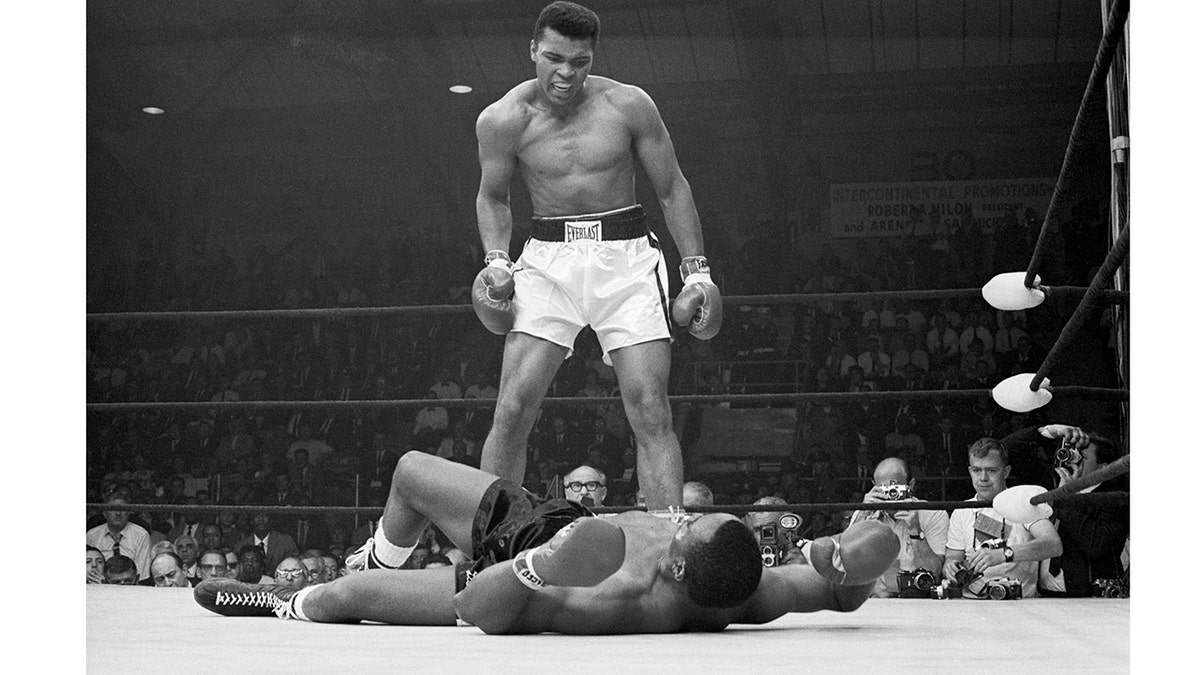
Heavyweight champion Muhammad Ali stands over Sonny Liston during their second bout in 1965 and taunts him to get up during their title fight. Ali knocked Liston out in one minute in the first round of their bout at the Central Maine Youth Center in Lewiston, Maine. (Getty Images)
Others allege it was an order from Nation of Islam leader Elijah Muhammad that fueled his refusal to serve in the military.
"I ain’t got no quarrel with those Vietcong." — Muhammad Ali
Born Cassius Clay in Louisville, Kentucky, in 1942, the pugilist punched his way into the national spotlight winning a gold medal in the 1960 Summer Olympics in Rome at age 18.
He captured the world heavyweight title with his famous upset of Sonny Liston in February 1964. Clay then publicly announced his conversion to the Nation of Islam immediately after the bout and said his new name was Cassius X.
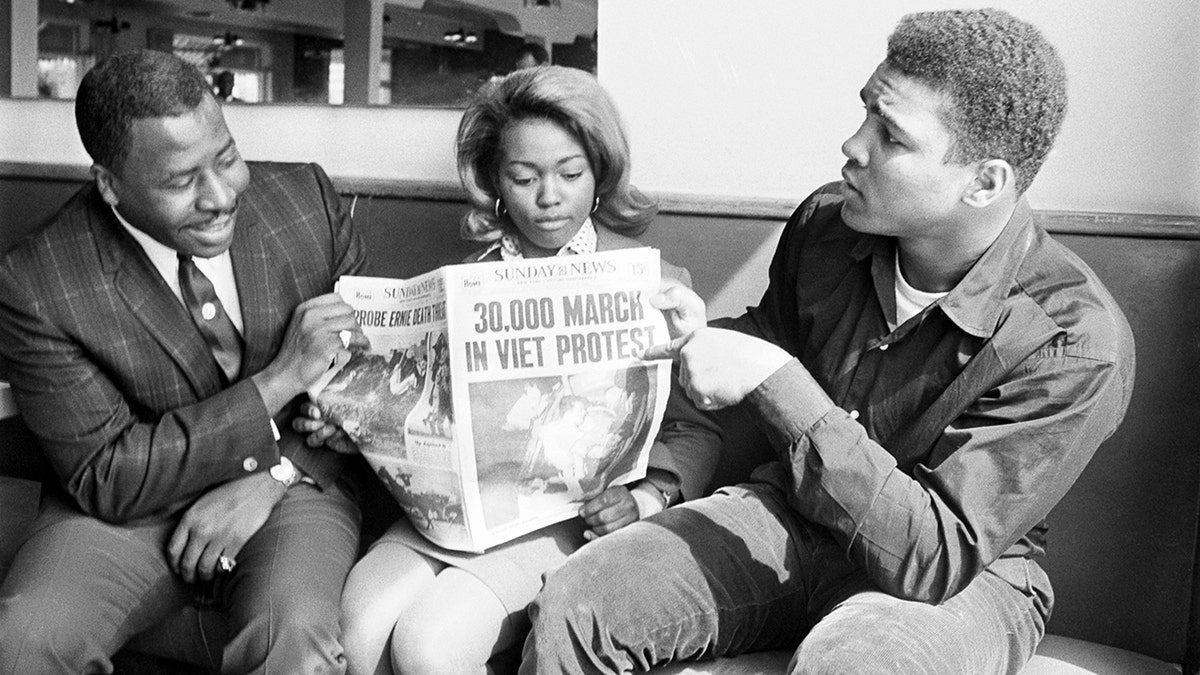
Cassius Clay points to a newspaper headline to show he's not the only one protesting the Vietnam War, March 28, 1966. The heavyweight champ was relaxing before his March 29th bout with Canada's George Chuvalo. Rozaa Rio, left, a recording artist from Chicago, came to Toronto to wish Clay luck. (Getty Images)
He was given his world-famous new identity by the Nation of Islam's Muhammad in a radio address on March 6.
"This Clay name has no meaning," said Muhammad. "Muhammad Ali is what I will give him as long as he believes in Allah and follows me."
Clay met Muhammad in 1962. The young boxer soon become good friends with one of the Nation of Islam's most famous followers, Malcolm X.
Ali's incredible skill in the ring, coupled with his beaming personality, made him one the world’s biggest sports celebrities and "the world’s most well-known Muslim," states the University of Louisville Libraries.
Ali stoically stood up for his beliefs in 1967.
His celebrity also made him a lightning rod in 1965, when he applied as a conscientious objector in his home state of Kentucky. The draft board denied his application.
He stoically stood up for his beliefs in 1967.
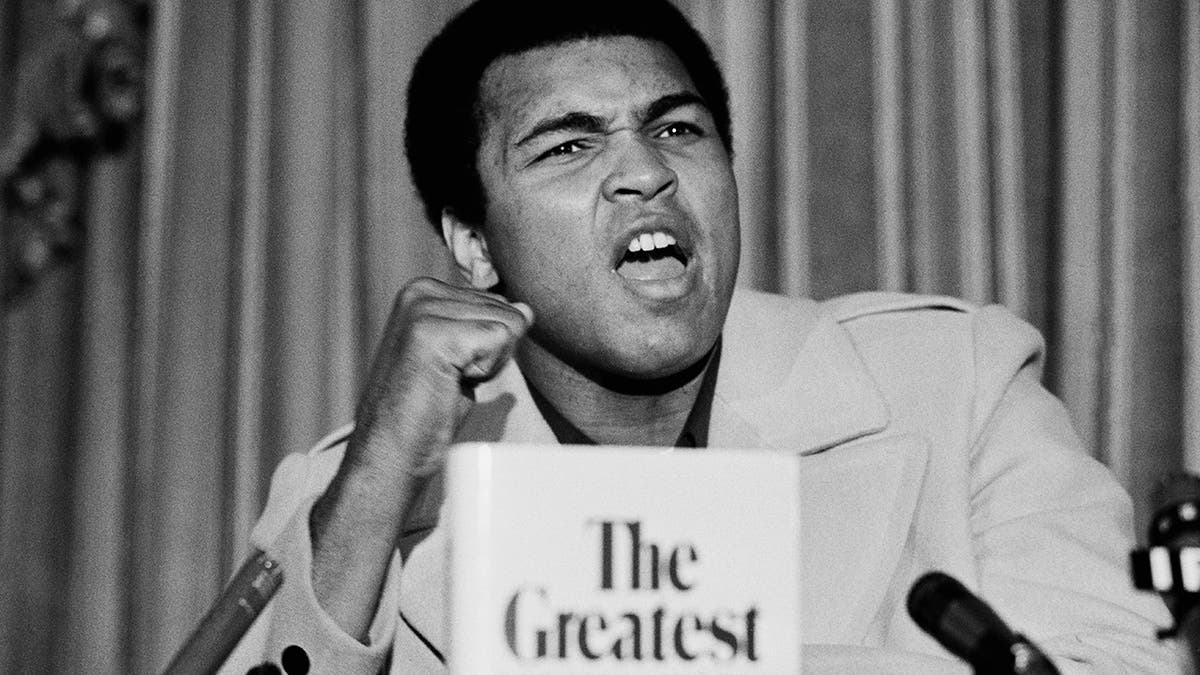
American pro boxer, activist, and philanthropist Muhammad Ali (1942-2016) at a press conference presenting his new autobiography, "The Greatest: My Own Story," held at The Savoy Hotel, London, U.K., March 10, 1976. (Evening Standard/Hulton Archive/Getty Images)
"During his scheduled U.S. Armed Forces induction in Houston, Texas, on April 28, Ali refused to step forward three times as his name was called," Sports Illustrated reported in recent years of the famous incident.
"After receiving a warning and being informed of the consequences, Ali did not acknowledge his name-call one final time. Later that day, Ali was stripped of his title and had his boxing license suspended, and he was found guilty of violating the Selective Services law on June 20, 1967."
He never served a day behind bars.
Ali was fined $10,000. He was banned from boxing for three years and sentenced to five years in prison.
He never served a day behind bars.
He fought the sentence all the way to the Supreme Court, which overturned his conviction for dodging the draft on June 28, 1971.
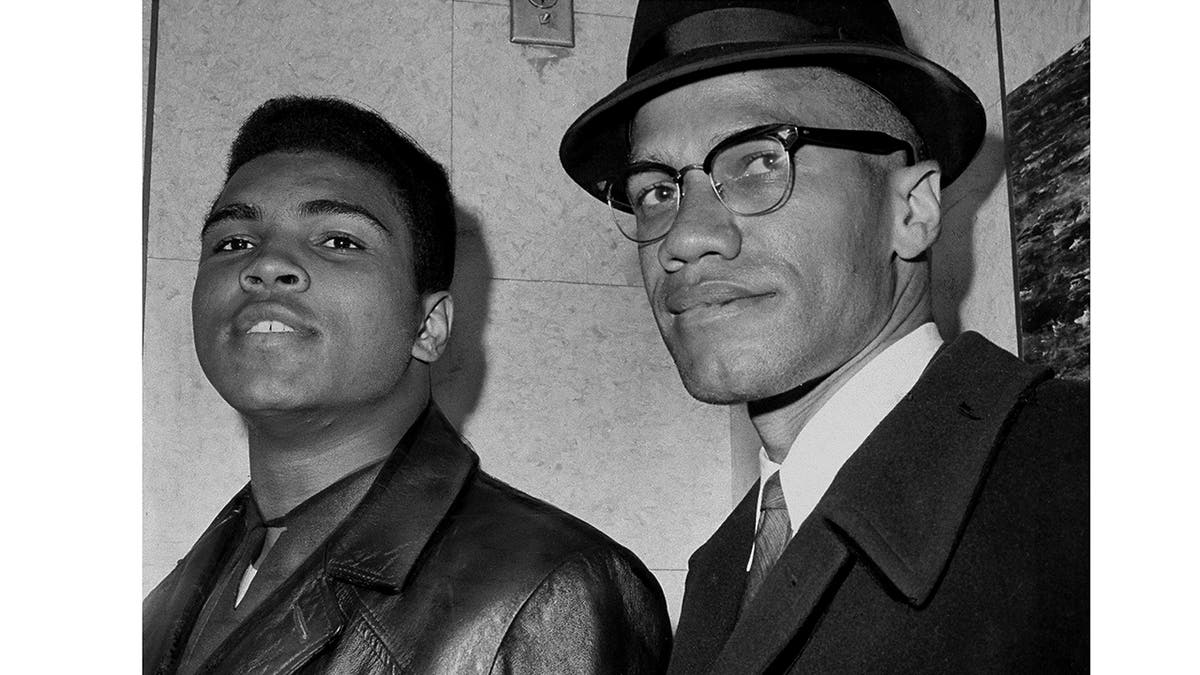
Left, Cassius Marcellus Clay — Muhammad Ali — with Black Muslim leader Malcolm X at 125th Street and Seventh Avenue in Harlem. Malcolm X was murdered in Harlem in 1965; his convicted killer, Thomas Hagan, was reportedly encouraged by Nation of Islam founder Elijah Muhammad. (John Peodincuk/NY Daily News Archive via Getty Images)
The high court ruled 8-0 in his favor, with Justice Thurgood Marshall recusing himself, citing earlier involvement as U.S. Solicitor General at the time of Ali’s conviction.
The court originally planned to vote 5-3 against Ali, authors Bob Woodward and Scott Armstrong wrote in their 1979 book, "The Brethren: Inside The Supreme Court."
Justice John Marshall Harlan changed his decision after reading "The Autobiography of Malcolm X."
But that left the court split at 4-4, which meant Ali would lose his appeal and the lower-court conviction would stand.
"The justices reconvened, since Ali was the best-known sports figure in the world," reports the National Constitution Center. "They wanted to provide an explanation. They worked toward a compromise that could at least detail the thoughts behind their decision."
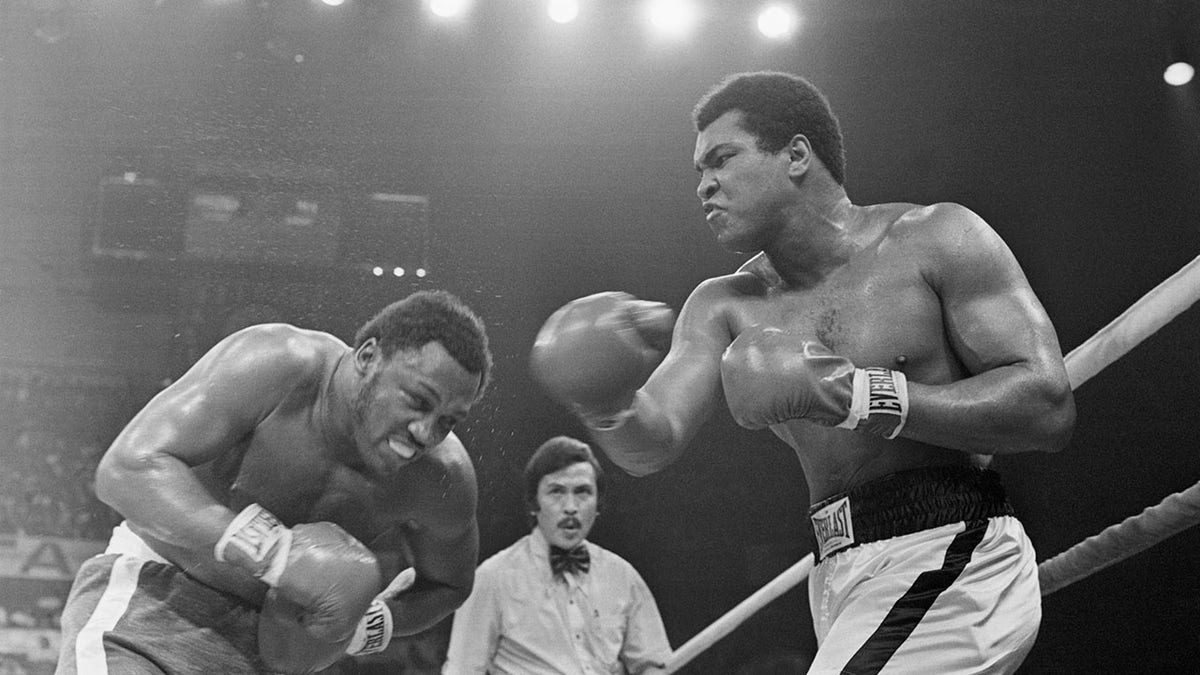
Muhammad Ali, right, punches Joe Frazier in the head during the 7th round of their boxing match. Referee Carlos Padilla Jr., in the center, supervises the heavyweight match in Manila, Philippines, in 1975. (Getty Images)
Eventually, the entire court flipped in Ali's favor.
Added the National Constitution Center, "Woodward and Armstrong said it was Justice Potter Stewart who looked at the case and convinced the other justices that the lower courts never explained why they turned down Ali’s appeals."
Ali had returned to the ring in October 1970, earning a third-round technical knockout of Jerry Quarry. He eventually regained his heavyweight crown in 1974.
Ali became a popular speaker at colleges across the United States.
"While away from boxing, Ali became a popular speaker at colleges across the United States," Sports Illustrated reported.
"One of Ali's most popular speeches, entitled ‘Black is Best,’ was spoken in front of 4,000 students and staff members at Howard University in 1968. He also became known for his free-style rhymes and poetry during his time in boxing."
CLICK HERE TO SIGN UP FOR OUR LIFESTYLE NEWSLETTER
Reports in recent years claim that Ali refused to serve in the military not out of religious conviction, but because of the wrath of Nation of Islam leader Muhammad.
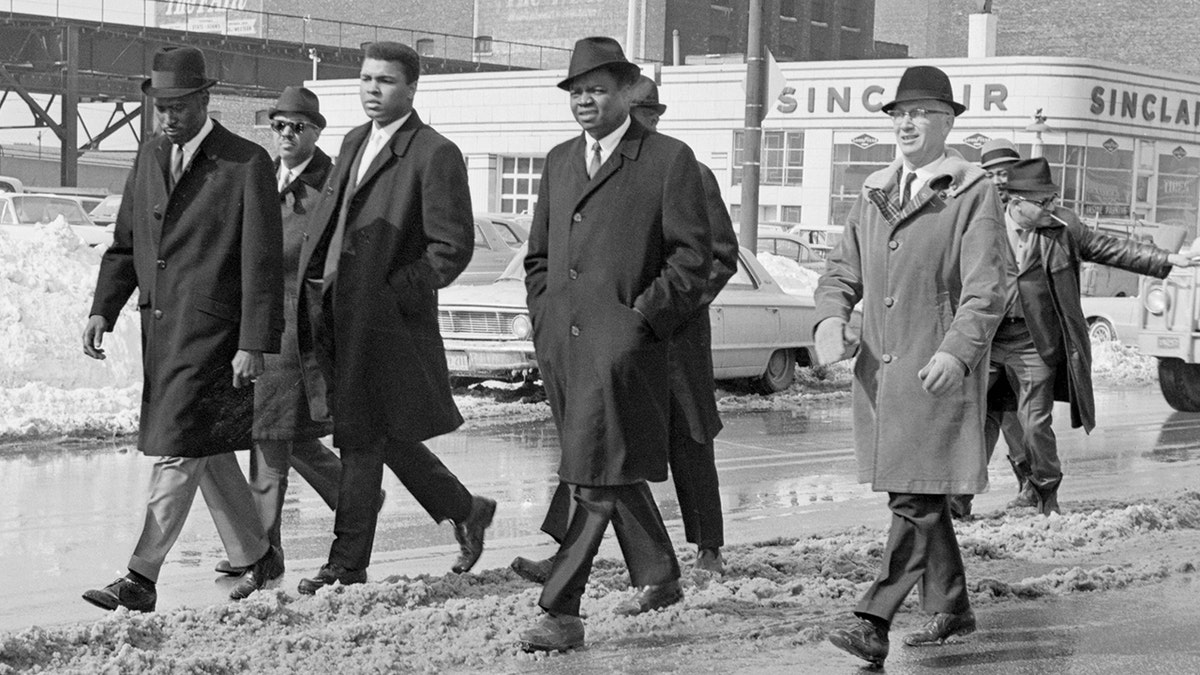
Heavyweight champion Cassius Clay (Muhammad Ali), third from left, is surrounded by bodyguards, arrived to listen to Black Muslim leader Muhammad Elijah open a three-day Black Muslim convention. There was speculation that Cassius Clay was the target of assassins trying to avenge the slaying of Malcolm X. (Getty Images)
"The truth, though hard to make out under the thick moss of mythology, is that Ali refused induction not out of principle but from fear of disobeying Elijah Muhammad, who had stipulated that the champ not serve in a ‘white man’s war,’" Paul Beston wrote in an editorial for The Wall Street Journal in 2017.
Ali, according to the story, tearfully admitted his fears to friend, mentor and fellow boxing legend Sugar Ray Robinson, who urged the young man to join the army.
CLICK HERE TO GET THE FOX NEWS APP
Added Beston, "Malcolm X, who had been close to Ali, was assassinated in February 1965. After Ali’s former press secretary told the FBI that he had information about Malcolm’s killers, he, too, was found dead. Other dissidents simply disappeared. Ali got the message."
For more Lifestyle articles, visit www.foxnews.com/lifestyle.








































